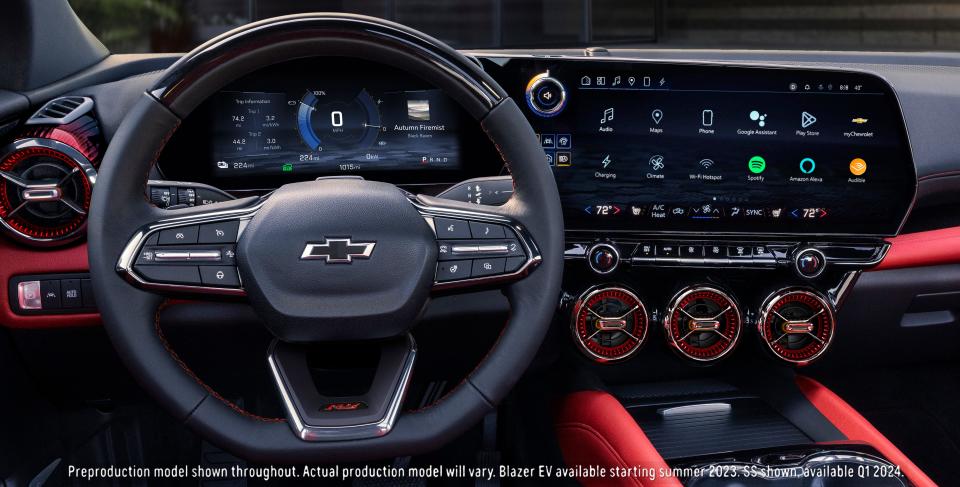‘A huge blunder’: GM’s decision to ditch Apple CarPlay, Android Auto sparks backlash
Will Lindley says he is ready to make the family's next ride an electric vehicle and had hoped to buy it from General Motors. After all, his wife has been happy with her 2016 Cadillac SRX. But when they heard that GM intends to phase out Apple CarPlay and Android Auto on its future EVs, that was a deal breaker.
Lindley and others want the option the technology offers, which is to project their iPhone’s screen onto their vehicle’s infotainment display for everything from accessing contacts to apps. Instead, GM will offer a built-in Google-powered infotainment experience on its future EVs that offers versions of Google Maps, Google Assistant, Spotify, and more.
So, Lindley said, now he's considering the all-electric Ford Mustang Mach-E built by GM's crosstown rival.

Ford spokesman Alan Hall told the Detroit Free Press. "We continue to offer Apple Carplay and Android Auto because customers love the capability that enables easy access and control of their smartphone apps, especially our EV customers."
Hall said Ford's decision is based on "a combination of third party data, as well as proprietary internal customer feedback."
A commitment to iPhone technology is important to buyers, including Lindley and his wife.
"We’re an Apple family as far as computers," he said. "Both of our cars work with CarPlay. The navigation is there, all the contacts for our phone are there, so if CarPlay is not an option, we’re going to go elsewhere."
Harsh reaction to GM's decision last month echoed across social media immediately with some people saying they will not buy a vehicle that doesn't offer CarPlay or Android Auto, prompting some car shopping experts to predict that GM may lose customers.
GM has said it will stop offering CarPlay and Android Auto beginning with its 2024 Chevrolet Blazer EV, which goes on sale this summer, and its built-in system will offer drivers more than CarPlay and Android Auto.
'Huge blunder'
One high-profile influencer — tech writer Walt Mossberg — shared on his LinkedIn professional page an April 4 article from The Verge headlined, "Everybody hates GM's decision to kill Apple CarPlay and Android Auto for its EVs."
Mossberg introduced the article by saying, "I think this is a huge blunder, which puts greed over consumer choice. I wouldn’t buy a car without Car Play and I bet millions of others feel the same."
Some say GM wants to create new revenue streams by selling subscriptions to certain features on the GM-built infotainment systems, plus gather data on how consumers use their EVs.
"GM is looking to monetize more software and services within its vehicles and is taking a page out of Tesla’s playbook," Dan Ives, managing director and senior equity research analyst at Wedbush Securities, told the Free Press.
Both Tesla and EV truck maker Rivian use their own in-house-built infotainment systems and do not offer CarPlay or Android Auto. But GM is a so-called legacy automaker whose massive customer base trumps that of either startup, and GM is offering new electric alternatives for consumers who fall outside the "early adopter" category of curious tech-savvy shoppers who want to be first to buy to try.
Taking Apple CarPlay and Android Auto out of its ecosystem, Ives said, "is about GM defending its turf and ramping software revenue in a move the Street likes despite some customer pushback."
GM CarPlay backlash: Why are consumers upset?
Both consumers and tech writers seem stunned.
The tech website 9to5mac.com pointed out March 31 that the latest GM decision comes "after GM went all-in CarPlay just a few years ago." The article said, "It’s a bad decision that I think the company will ultimately regret."
Reader comments on the site include:
"I think car manufacturers seriously underestimate how important this is to consumers. Tesla has been able to ignore it so far because their supply was limited and they couldn't meet demand anyway. But once they build enough production capacity, they are going to want to sell to people that won't buy a car without CarPlay. I have wireless CarPlay and can say absolutely that I would never buy a car without it."
"I was thinking about getting a Chevy for a new car in a year or two. Looks like GM changed my mind. My current car doesn’t have CarPlay, and having it on the new car is a big deal, especially after using CarPlay for navigation and music on a recent road trip in a rental car. Guess I’ll need to look elsewhere, like Toyota."
"People want CarPlay and Android Auto in their cars, and not some bloated, poorly-designed proprietary system designed by auto manufacturers and their 'partners.' I wasn't going to buy a GM, so I'm unaffected, but I was hoping they would continue to support EV's with all features consumers want. We have a Tesla Model Y and Hyundai Ioniq 5, and I can tell you I miss CarPlay every time I drive the Tesla."
More: Chevrolet's big year as it rolls out these new EVs and a hybrid Corvette
GM is definitely in the spotlight.
Harry McCracken, global tech editor at Fast Company magazine, tweeted on April 5 to his 91,000 followers, "GM oughta New Coke this and come out a winner by undoing a bad move."
And after Domino's pizza announced an easy new ordering app available on CarPlay, Roberto Baldwin, a senior editor at Car and Driver who specializes in technology coverage, tweeted on April 11, "Checkmate GM."
GM oughta New Coke this and come out a winner by undoing a bad move. https://t.co/cFfzeDXF1k
— Harry McCracken 🇺🇦 (@harrymccracken) April 5, 2023
GM defends CarPlay change
GM spokeswoman Kelly Cusinato defends the move. She said a GM-built infotainment system will give its customers a better experience than CarPlay or Android Auto.
Checkmate GM pic.twitter.com/xrGrwmJFhK
— Roberto “legacy” Baldwin (@strngwys) April 11, 2023
"We’re confident customers will see the capabilities, ease of use and benefits of this integrated system, as they become more familiar with it," Cusinato said. "We only recently introduced a version of the built-in system on select 2023 models and we’re excited to let more customers experience an enhanced version soon on future EVs."

GM's built-in infotainment system will offer real-time navigation and voice commands, access to a growing list of apps within the Play Store and can read and play back through the voice system text messages from smartphones when connected over Bluetooth, Cusinato said. The new system will also account for the temperature of the EV’s battery when routing the car to a charging station and get the battery ready for charging, thus maximizing range and minimizing charging time when the customer arrives at the station, she said.
It's all GM's answer to this year's J.D. Power Vehicle Dependability study that showed infotainment systems to be a point of contention for many consumers.
'It's a money grab'
Critics note the new system will provide GM with information on customers' driving, listening, and charging habits.
The data collected could influence future subscription products for GM, something many automakers are looking to do as a way to make money beyond just selling cars. For example, last summer luxury automaker BMW started selling some new eye-popping subscription-based services in various countries, included charging drivers $18 a month for heated seats and $10 per month for a heated steering wheel, features that critics argued should be standard.
In December, Alan Wexler, GM's senior vice president of strategy and innovation, told Wall Street investors that the company has no intention of charging its customers for such features. But, Wexler said, GM is certain that vehicle software, and the microtransactions it will allow, such as paying for cloud-based services, will be the bigger business for it in the future.
When asked about GM's future plans to monetize features through the system, Cusinato said, "We are guided by our desire to make the EV customer experience a differentiator in the future and the goal of building on, not stepping back, the benefits Apple CarPlay and Android Auto introduced years ago. We are not expecting customers to pay for basic connectivity. All 2024 Chevy Blazer EVs in the U.S. will come with standard connectivity that allows easy access to Google Maps and Google Assistant, at no additional cost, for eight years."
More: Electric vehicle owners reveal surprising top favs — not Tesla, Ford, GM or VW
That does not convince Lindley, who said he believes eventually there will be fees, "They’re looking at pure dollar signs. To keep the navigation on the car, you’re going to have to pay GM a monthly fee. For my bet, it’s a money grab and if they can generate additional revenue, then more power to them. They’re doing what they have to do for the shareholders. But I don’t have to be a part of it."
Consistenc
A driver's ability to display their phone's screen on a car's infotainment screen through CarPlay or Android Auto is something shoppers care about, said Ivan Drury, director of insights at car shopping site Edmunds.com.
Based on shopper data in which people can select search filters when looking for new and used cars on Edmunds, Drury said the findings showed, "Nearly half of consumers putting connectivity on their must haves will be concerned about those functions from Apple and Android."
Even for shoppers of used vehicles, Drury said the numbers of shoppers wanting the technologies are similar to those shopping for new cars. Drury said the reason the technology is so popular among car buyers is because it is familiar and people like consistency.
Yet the J.D. Power 2023 U.S. Vehicle Dependability Study released in February listed six of the top 10 problem areas in the study as infotainment-related, including Android Auto and Apple CarPlay connectivity.
More: GM shines, Ford fails to impress in new J.D. Power dependability study ranking
“Initial Quality Study and Vehicle Dependability Study data are telling us that if the Android Auto/Apple CarPlay connectivity trend continues, this area could take over the least-coveted top spot for problems in long-term durability,” said Frank Hanley, senior director of auto benchmarking at J.D. Power.
'Giving them a reason to look elsewhere'
But ever since the inception of an in-vehicle entertainment system began, there has been a love/hate relationship with the native apps and interfaces, Drury said, adding that, "many are the source for major frustrations ... leading consumers to either looking down at their phone, mounting a suction cup based holder or ... they can bypass the shenanigans and simply connect through Apple Carplay or Android Auto."
The systems have led to a level of familiarity so that even if a driver is in a different vehicle, the experience they have with their phone and infotainment system stays constant. But he admits GM's decision is initially jarring given Apple's "cult-like following."
"But from a business stance, I get it, data is valuable, vehicle usage statistics can help to make decisions about future vehicle design, marketing, et cetera ... but it can be leveraged for repackaging and selling," Drury said. "While I can't imagine that GM will be losing their entire base of iPhone users, they're certainly giving them a reason to look elsewhere."
The impact has not been felt yet. GM's Cusinato said reservations for the new Blazer EV have not diminished in the last few weeks and continue to grow.
More: 2024 Chevy Blazer EV expected to get nearly 300 miles of range, go 0-60 mph in 4 seconds
More: GM CEO Barra's plan for automaker to lead the industry in EV profits
More: Analysts debate whether GM could surpass Tesla as top-selling EV maker in US
Contact Jamie L. LaReau: jlareau@freepress.com. Follow her on Twitter @jlareauan. Read more on General Motors and sign up for our autos newsletter. Become a subscriber.
This article originally appeared on USA TODAY: GM Apple CarPlay removal sparks backlash. What's behind the decision?
